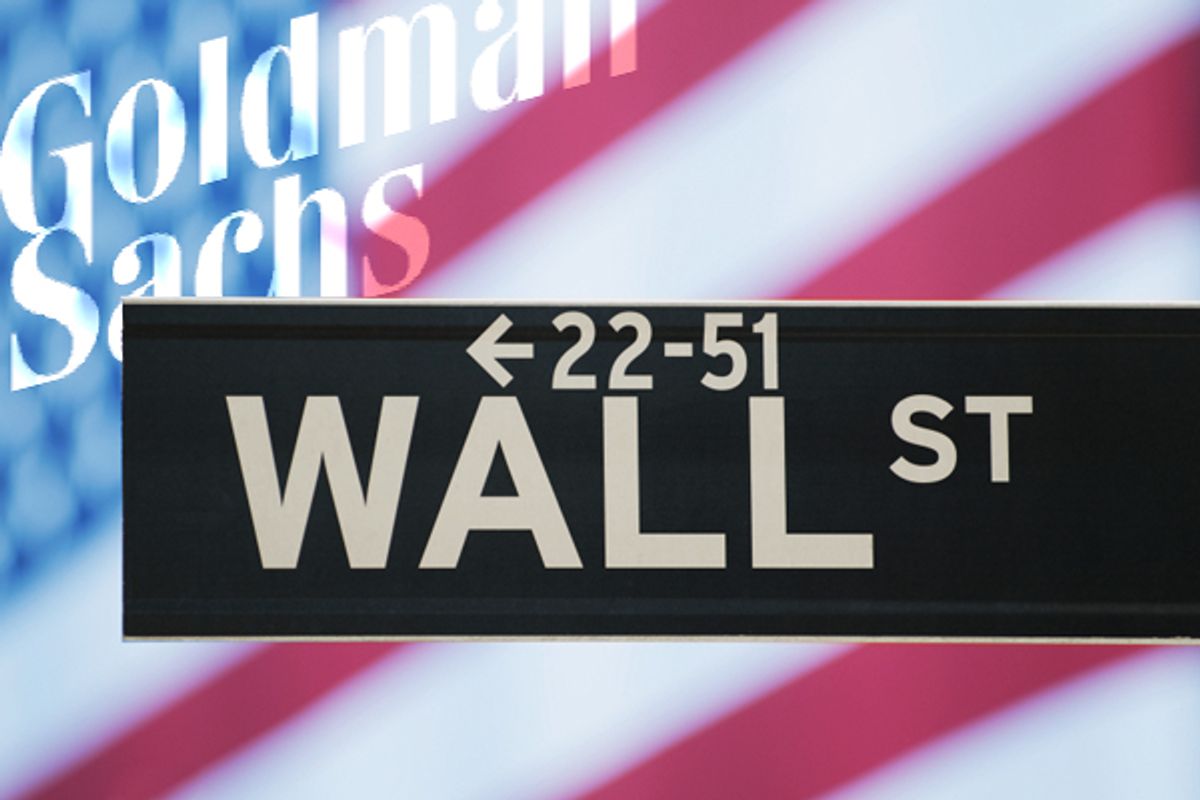In the magisterial report released in April by the Senate's Permanent Subcommittee on Investigations, "Wall Street and the Financial Crisis: Anatomy of a Financial Collapse," a section recounting how Goldman Sachs profited off speculation in mortgage-backed securities -- at the expense of its own clients! -- closes with the following j'accuse:
Investment banks were the driving force behind the structured finance products that provided a steady stream of funding for lenders originating high risk, poor quality loans and that magnified risk throughout the U.S. financial system. The investment banks that engineered, sold, traded, and profited from mortgage related structured finance products were a major cause of the financial crisis.
In this formulation, all the investment banks are equally guilty of bad corporate citizenship. But as anyone who has been to an Occupy protest or read a Matt Taibbi Rolling Stone screed or simply scanned the business headlines for the last three years knows, the name Goldman Sachs means something different to the general public today than Morgan Stanley or Citigroup or Merrill Lynch. Goldman Sachs, once lauded as the acme of capitalism, is now, in the popular mind, a watchword for Wall Street greed and irresponsibility. It is the vampire squid. None other can compare.
There are many reasons, large and small, for Goldman's notoriety. Not least is pure arrogance -- perfectly exemplified by the sorry spectacle of Lloyd Blankfein declaring that Goldman was "doing God's work." Or we could start with the legacy of one Goldman CEO turned treasury secretary, Robert Rubin, who supported and helped pass many of the deregulatory measures that encouraged Wall Street irresponsibility. Or another, Hank Paulson, who not long after leaving Goldman for Washington orchestrated a massive handout to his own industry, without any strings attached. And then there's even a third, Jon Corzine, who has spent much of this week disingenuously testifying about his lack of knowledge as to what employees at his most recent firm, MF Global, were actually doing as the company somehow misplaced billions of dollars of its clients' money.
It has not been an edifying spectacle. Goldman's political influence has historically been greater than any other investment bank's. This is no longer a mark in the bank's favor.
But what singles Goldman Sachs out for special opprobrium isn't the culpability it shares with other investment banks for helping to create the financial crisis and then get bailed out with taxpayer dollars. It's the fact that Goldman Sachs figured out, before any of its Wall Street colleagues, that the housing boom was a house of cards and the entire mortgage-backed security market was headed for a crash. Goldman wasn't caught by surprise by the revelation that the mortgage securities it was creating were toxic junk. Quite the opposite. But instead of sending up an alarm bell and using its political influence and lobbying muscle to try to fend off the coming disaster, Goldman Sachs simply liquidated the positions in which it would be vulnerable to a downturn and started betting, instead, on the likelihood of disaster. As the Senate report acidly notes, in December 2006, "when it saw evidence that the high risk mortgages underlying many RMBS and CDO securities were incurring accelerated rates of delinquency and default, Goldman quietly and abruptly reversed course."
Smart for Goldman -- in 2007, the company had one of the best years any investment bank has ever enjoyed. CEO Lloyd Blankfein alone earned $68.5 million that year. But not so smart for the rest of us. We despise Goldman Sachs more than we despise any other Wall Street institution because Goldman was smart enough to know what was happening to the economy, smart enough to mint billions in profit while the world headed toward the worst economic disaster since the Great Depression, but not smart enough to share the news. A responsible CEO of one of the nation's most influential corporations should have been testifying before Congress every week warning of imminent disaster. But that might have ended up negatively influencing his compensation.
With that background in mind, a review of some of our favorite metrics seems beside the point. But for what it's worth:
Executive compensation: In 2010, Lloyd Blankfein earned $13.2 million as CEO of Goldman Sachs. A far cry, to be sure, from his 2007 heyday, but still pretty good for the head of a company that had to settle civil fraud charges brought against the firm by the SEC. In 2011, even as the company reported a quarterly loss for only the second time since going public in 1999, the firm still managed to put aside $10 billion for a bonus pool to be divided up among its 30,000 employees.
Lobbying: For the perfect, paradigmatic Goldman lobbying story, we must go back to 2004, when five Wall Street investment banks, with Hank Paulson taking the lead, pressured the SEC to change a rule that limited how much debt a bank could take on. The banks wanted the SEC to lower its requirement for how much capital the banks had to keep as a cushion against possible trading losses -- Hank Paulson had been personally arguing for a change in this rule as far back as 2000. The banks won -- and then proceeded to employ their new leverage to engage in a speculative frenzy that left them all desperately vulnerable -- and requiring a federal bailout -- when the market crashed. Who delivered the bailout? Hank Paulson!
Taxes: Goldman Sachs paid no income taxes in 2008, but paid a hefty tax bill in 2009 (at a 38.0 percent rate) and came in at close to the average in 2010 (a 20 percent rate).
We'll leave you in suspense no longer: Salon's corporate citizenship grade for Goldman Sachs is an F-.



Shares